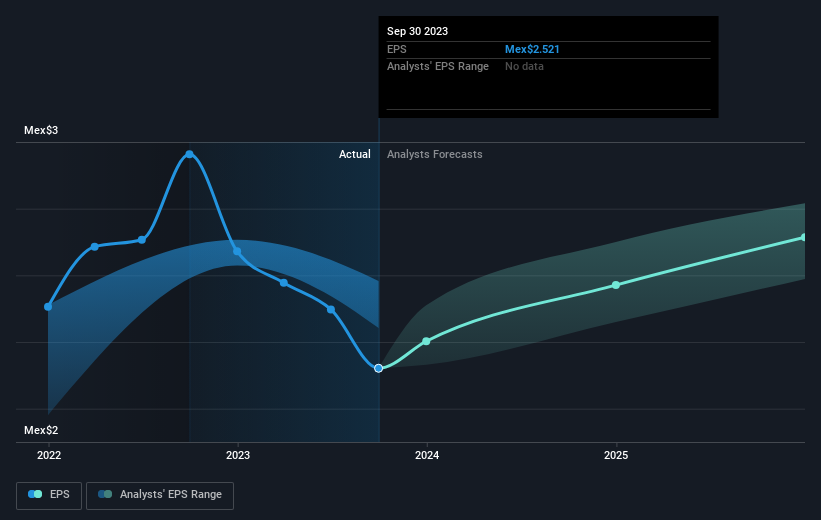- Mexico
- /
- Capital Markets
- /
- BMV:BOLSA A
Bolsa Mexicana de Valores. de's (BMV:BOLSAA) earnings have declined over three years, contributing to shareholders 16% loss

Bolsa Mexicana de Valores, S.A.B. de C.V. (BMV:BOLSAA) shareholders should be happy to see the share price up 18% in the last month. But that doesn't help the fact that the three year return is less impressive. Truth be told the share price declined 28% in three years and that return, Dear Reader, falls short of what you could have got from passive investing with an index fund.
While the last three years has been tough for Bolsa Mexicana de Valores. de shareholders, this past week has shown signs of promise. So let's look at the longer term fundamentals and see if they've been the driver of the negative returns.
See our latest analysis for Bolsa Mexicana de Valores. de
While markets are a powerful pricing mechanism, share prices reflect investor sentiment, not just underlying business performance. One imperfect but simple way to consider how the market perception of a company has shifted is to compare the change in the earnings per share (EPS) with the share price movement.
During the three years that the share price fell, Bolsa Mexicana de Valores. de's earnings per share (EPS) dropped by 0.8% each year. This reduction in EPS is slower than the 10% annual reduction in the share price. So it's likely that the EPS decline has disappointed the market, leaving investors hesitant to buy.
The image below shows how EPS has tracked over time (if you click on the image you can see greater detail).

It might be well worthwhile taking a look at our free report on Bolsa Mexicana de Valores. de's earnings, revenue and cash flow.
What About Dividends?
It is important to consider the total shareholder return, as well as the share price return, for any given stock. The TSR incorporates the value of any spin-offs or discounted capital raisings, along with any dividends, based on the assumption that the dividends are reinvested. It's fair to say that the TSR gives a more complete picture for stocks that pay a dividend. We note that for Bolsa Mexicana de Valores. de the TSR over the last 3 years was -16%, which is better than the share price return mentioned above. This is largely a result of its dividend payments!
A Different Perspective
While the broader market gained around 4.4% in the last year, Bolsa Mexicana de Valores. de shareholders lost 7.6% (even including dividends). Even the share prices of good stocks drop sometimes, but we want to see improvements in the fundamental metrics of a business, before getting too interested. On the bright side, long term shareholders have made money, with a gain of 4% per year over half a decade. It could be that the recent sell-off is an opportunity, so it may be worth checking the fundamental data for signs of a long term growth trend. While it is well worth considering the different impacts that market conditions can have on the share price, there are other factors that are even more important. Consider for instance, the ever-present spectre of investment risk. We've identified 1 warning sign with Bolsa Mexicana de Valores. de , and understanding them should be part of your investment process.
Of course Bolsa Mexicana de Valores. de may not be the best stock to buy. So you may wish to see this free collection of growth stocks.
Please note, the market returns quoted in this article reflect the market weighted average returns of stocks that currently trade on Mexican exchanges.
Valuation is complex, but we're here to simplify it.
Discover if Bolsa Mexicana de Valores. de might be undervalued or overvalued with our detailed analysis, featuring fair value estimates, potential risks, dividends, insider trades, and its financial condition.
Access Free AnalysisHave feedback on this article? Concerned about the content? Get in touch with us directly. Alternatively, email editorial-team (at) simplywallst.com.
This article by Simply Wall St is general in nature. We provide commentary based on historical data and analyst forecasts only using an unbiased methodology and our articles are not intended to be financial advice. It does not constitute a recommendation to buy or sell any stock, and does not take account of your objectives, or your financial situation. We aim to bring you long-term focused analysis driven by fundamental data. Note that our analysis may not factor in the latest price-sensitive company announcements or qualitative material. Simply Wall St has no position in any stocks mentioned.
About BMV:BOLSA A
Flawless balance sheet with solid track record and pays a dividend.
Similar Companies
Market Insights
Community Narratives



